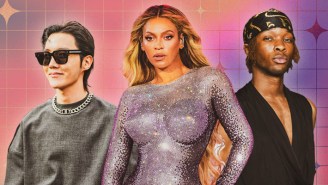When Eddie Huang’s directorial debut, Boogie, was announced, much attention was given to the presence of one of its stars: the late Brooklyn drill rapper Pop Smoke, in his own posthumous acting debut. While it was at one point considered unusual for rappers to jump into acting — especially before they ever had an album to their name — in recent years, it’s become much more common for a new and rising star to already have their hands in many different arts to ensure that at least one of them pays off. From Vince Staples in Dope to Cardi B in Fast 9 to Quavo in Wash Me In The River, more actors than ever are pursuing side careers in film.
The question on everyone’s minds, then, was whether or not Pop Smoke’s acting chops lived up to the billing. In the film, he portrays the title character’s rival hooper, as Boogie (Taylor Takahashi, also in his debut), a first-generation Chinese-American basketball player, transfers to a new school in the hopes of drumming up interest from a college program that can get him closer to the NBA. Of course, Boogie’s life is complicated; his estranged parents battle each other over his path to pro hoops and he becomes interested in a girl at his new school, all while butting heads with his coach over his role on the team.
From a pure “movie” standpoint, Boogie shows all the hallmarks of a debut directorial effort from Huang. While the foundation of the story is solid and the performances are for the most part superb, there are probably a few too many plot threads that need tying off by the film’s conclusion, many of which are pretty cliched. The dialogue suffers from “trying to be hip,” and it’s also unintentionally funny, possibly at times that aren’t meant to be — but that’s also probably a result of its New York shooting locations. There’s one moment in which a bystander can be heard reacting to Boogie’s dialogue with his love interest as he tries to explain the friction of balancing 5,000 years of cultural history with second-class citizen status.
Also — and this part just might be due to my proximity to the game — but I found myself a little bit frustrated with the basketball culture as presented. What little gameplay is seen is serviceable at best (with odd dialogue that doesn’t seem to suit the action on-screen), but while the behind-the-scenes workings of recruiting, scholarships, and overseas offers read true-to-life, there is astonishingly little context presented for any of it. If someone were completely unversed in how this stuff works, they’d be confused — even worse, for someone who is well-versed, it’s even more confusing.
When the choice is posed between skipping one year of NCAA eligibility to play for the Shanghai Sharks or walking on at Georgetown in the hopes of securing an NBA berth, I found myself flabbergasted that the former route seemed to preclude the latter outcome when several players have already been successful at it (more so than the traditional route of playing for a few years at a ranked school). It feels almost like advocating for the exploitative practices of the NCAA, while simultaneously dumping on non-US leagues — where US-born players often thrive and Jeremy Lin, who the film name-checks early on, went in the process of mounting his NBA comeback.
But Pop Smoke’s character appears relatively early and looms over the proceedings, giving the Brooklyn rapper plenty of opportunities to shine. He makes the most of them, stealing nearly every scene he’s in and giving off a magnetic aura that pulls the viewer in. He snarls on the court and smirks in the protagonist’s face, his husky growl dousing every line in sizzling New York authenticity. His performance made me wish that the love story had been cut in the interest of cultivating the two players’ rivalry — for the most part, we mostly hear about how Monk being the best player in the city, and rarely do the two actually share the screen in the first two-thirds of the runtime.
When they do, however, the screen lights up and the electricity is palpable. I found myself doing that two-panel meme of the guy playing the video game all laid-back until the score gets close. I scooted forward on my couch, leaning in to soak in the aura of tension. Much of this aura is given off by Takahashi, but the majority of it is Pop Smoke, who practically vibrates off the screen. It’s probably presumptuous to make a comparison to Tupac in Above The Rim… but that’s exactly what I’m going to do because even if the comparison isn’t apples to apples, the clementine that is Pop Smoke sure looks like a Tupac orange that just hasn’t grown up yet.
While the film makes little effort to flesh out the character — outside of repeated mentions of how badly Boogie needs to beat Monk — Pop Smoke does plenty of that work himself. He gives Monk a cocky, borderline brutish demeanor, but he holds back from pure thuggery. Monk is a New York classic, a trash talker who does whatever it takes to get into his opponent’s head and throw them off their game. And as infuriating as that can be — both on the court and in real life — Pop is a charismatic enough personality to not only pull it off but also to make viewers like his character almost as much as Boogie.
The one real drawback is that Pop’s performance is dragged down the same way the movie is; through unsure editing and amateurish writing. Not to speak ill of the dead, but the quick cuts during Pop’s on-court play make it clear he had way more talent on the mic than with a ball. Also, he’s alternatively listed on Google as either 5’5″ or 5’11”, which means those dunks are either being performed by a body double or on an eight-foot rim. He may have had plenty of potential as a future actor but a J. Cole-esque hoop dream pursuit was definitely out of the question.
Ultimately, Pop Smoke shining in his debut role the world winds up mostly highlighting — once again — how truly tragic his untimely demise remains. It seems certain now that he would have continued to grow in stature — his posthumous debut album, Shoot For The Stars, Aim For The Moon was one of 2020’s most-streamed projects and demonstrated how truly versatile he could be — and collect further roles as charismatic villains and possibly even roguish heroes. Even in the limited screentime that the movie allows, he becomes the center of every scene he’s in — that is the very definition of star power. Unfortunately, the world will instead continue to miss out on the growth and charm of Pop Smoke, who by every indication here, had all the making of a bonafide movie star.







